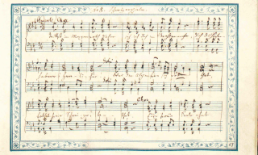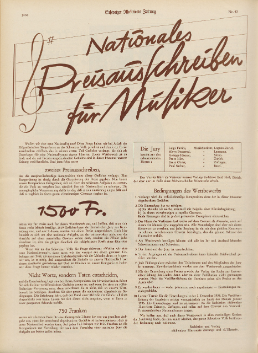Switzerland did not have an official national anthem until 1961. In that year the Federal Council chose Trittst im Morgenrot daher... ("When the morning skies grow red...") to fill that role, initially for a trial period of three years. The decision had been preceded by almost a century of searching. There were even competitions to find a suitable candidate, including one launched in 1935 by the Schweizer Illustrierte.
«Rufst Du mein Vaterland» versus «Schweizer Psalm»
Until the end of the 1950s, the tunes most commonly played at official events in Switzerland were Rufst Du mein Vaterland ("When my Fatherland calls") and the Swiss Psalm (Trittst im Morgenrot daher...). The poem Rufst Du mein Vaterland was written by Johann Rudolf Wyss (1782-1830), a professor of philosophy at the University of Bern. From the outset, it was probably sung to the tune of the British national anthem God Save the King (today God Save the Queen). The author of the melody is unknown, but it certainly became known in the mid-18th century, first in Britain, before being widely adopted in continental Europe. In the 19th century it was routinely used by numerous kings, dukes and princes of the German Reich. Nowadays, it survives as the tune of the British national anthem, the tune of the national anthem of the Principality of Liechtenstein (Oben am jungen Rhein lehnet sich Liechtenstein an Alpeshöhn) and Rufst du mein Vaterland.

The Swiss Psalm, by contrast, is a purely Swiss creation. It was composed by Alberik Zwyssig (1808-1854), a Cistercian monk living in Wettingen Abbey. The tune of the Swiss Psalm was originally a church hymn based on the psalm Diligam te Domine. In 1841, Zwyssig set the text of the Swiss Psalm by Leonhard Widmer, a lyricist from Zurich, to the tune of his melody. In the years that followed, the song was performed at singing festivals and found its way into the repertoire of the Swiss Singers' Association. (The manuscript of the Swiss Psalm is held by the Swiss National Library.)
Over time the lyrics of Rufst Du mein Vaterland, which was often played as the unofficial national anthem, came to be seen as outdated. Increasing international contacts in the 20th century also led to growing confusion when both the Swiss and British anthems were played. For this reason, there were calls for Rufst Du mein Vaterland to be replaced by the Swiss Psalm, and for the latter to be declared the country's official national anthem.
But the Swiss Psalm also had its opponents. There was criticism of the text's religious content (which was felt to render it unsuitable for sporting occasions) and what some saw as the overly complicated tune. Its advocates countered the first argument by pointing out that the song was mostly played rather than sung at sporting events.
As regards the complexity of the tune, the Swiss composer Gustave Doret commented publicly in the following terms: "Has France ever considered abandoning the Marseillaise, a work of brilliance but incomparably more difficult to perform than Zwyssig's elementary choral composition?"
1894 – the search for a national anthem begins
The Federal Council expressed its views on the issue of a Swiss national anthem on a number of occasions. The first was in 1894, in response to a submission by a singing teacher from Geneva who argued that the Swiss Psalm should be made the country's official national song. The Federal Council observed that "the introduction of such a song cannot be ordered by the resolution of some government authority, but must be left to the tastes of the singing public to decide." In 1933, there followed a further submission to the Federal Council in the same terms as the 1894 request. This time, over 250 delegates of the Swiss Singers' Association called for the Swiss Psalm to be officially declared Switzerland's national anthem. They were supported by the board of the Swiss Musicians' Association. The Federal Council issued its reply in 1934: for the same reasons as in 1894, it considered itself unable to take a decision.
In 1941, a hundred years had passed since the Swiss Psalm was first performed. To mark this centenary, together with the celebrations of 650 years of the Swiss Confederation, a further request was made to the Federal Council to make the Swiss Psalm Switzerland's national anthem. This time, the Federal Council sought the views of the Swiss Singers' Association and the Swiss Musicians' Association. The Singers' Association no longer felt able to support the request without reservation as it had in 1933, arguing that the national exhibition of 1939 and the outbreak of global conflict actually lent new vitality and greater topicality to Rufst Du mein Vaterland. The Swiss Musicians' Association, meanwhile, reaffirmed its support for the Swiss Psalm. Once again, the Federal Council felt unable to take a decision.
The debate continued in the years that followed. In 1953 the Arbeitsgemeinschaft der Schweizer Sänger, a consortium of Swiss singers, came out in favour of Rufst Du mein Vaterland (and also proposed changing the lyrics, though that in itself would not have removed the potential confusion surrounding the tune). A parliamentary request by Council of States member Gotthard Egli (jointly signed by 30 members of the Council) in 1954 invited the Federal Council, "in association with the cantons and the relevant associations, to carry out a survey and take steps towards recognising as national anthem a song that accords with the sensibilities of the people. This may include organising a competition to find a new national anthem."
In the 1955 spring session, a decision was taken to "enter into discussions" with the cantonal governments on the matter, though it was added that "no great hopes should be attached to a competition".
Similar competitions had already been held in the past, the first being organised in 1919 by the Swiss Singers' Association.
“National Prize Competition for Musicians”

In 1935 a competition was organised by the Schweizer Illustrierte Zeitung. In total, 1,819 lyrics and 581 compositions were submitted. However the jury, made up of representatives from the worlds of literature and music, found itself unable to recommend any of the proposed tunes as the national anthem. Prizes were awarded to four of the lyrics and compositions published in the Schweizer Illustrierte Zeitung.
In 1981, a consultation among the cantons resulted in the trial period, which had been renewed every three years since 1961, being abolished and the Federal Council confirming that When the morning skies grow red... would be retained as the official national anthem. A motion submitted in the National Council in 2004 calling for the lyrics of the anthem to be modernised was withdrawn in 2006.
If you would like to sing along (in one of Switzerland's official languages) on 1 August, you can find the lyrics of the Swiss national anthem here in French, Italian, Romansh and German.







